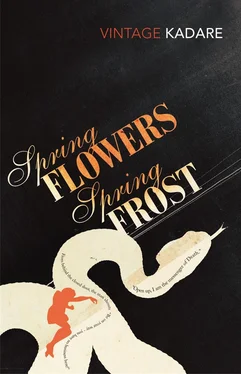At the next table, a new set of customers had taken the places of the previous drinkers. A well-established conversation on the prospects of a war in Kosovo was in train. Hostilities would break out next winter, no doubt about it. This assertion was hammered out with such force that two of the drinkers seemed to shrink under the blow, bearing the signs of a battle that had not yet hit them.
Mark felt he had to get up and leave this evil café. No, no, he thought, I haven’t done anything to deserve that! And it was true that he didn’t deserve to have liberty, for which he had waited with such fervor for so many years, come to him in the form of lunacy.
The cold outside did him good. As he walked toward home, he passed the town hall, past the corner of the building where official death notices were posted. He stopped for a while to read them, one by one, but in an odd way doubting the truth of each. He was convinced that the number of people who for one reason or another have themselves declared dead though they are still alive was on the increase. It was already four years since a friend of his from Tirana, passing through this small town, had told him that he intended to disappear for a while, if he could earn enough money for it. “It’s safer that way. I plan to settle in Canada, or else have myself declared dead.”
Before taking the turn into his own street, he strolled around the empty square that looks onto the park. Zef’s windows seemed lit, though very faintly. Mark took cautious steps, as if he feared that a clumsy footfall might extinguish the light in the window. But that’s what happened a few minutes later — Zef’s light went out. He thought for a moment that it might be coming back on, but it wasn’t a light, properly speaking. It was more like a pale reflection of the lantern of a cart coming down from the highlands. But that glimmer also quickly disappeared.
It was then that he became sure that a new species of human being — able to move from the light to the underworld and back again — was already among us, in large numbers. They had no name for the time being, but they probably soon would. For instance, they could be called the unliving, or else the undead.
Two or three times he recalled the icy gleam in the eyes of the chief of police. You could not dismiss the possibility that the policeman had thought Mark was a member of the new race.
Mark tried to remember with whom he might have discussed the theft of immortality by Tantalus, but it made him laugh at himself. A conversation of that kind would indeed have made the secret policemen of old prick up their ears, because the words immortal and immortality were not often used outside the context of the Supreme Leader. But all that had ceased to be imaginable. Nowadays, the most that Mark could be suspected of was involvement in the holdup of the bank at B—.
THE STRAIT OF OTRANTO … Where all lie in peace …
There are hundreds of us down here. Some called out to the Virgin Mary as we sank; others invoked Allah, Jehovah, or even Buddha. We are Ukrainian, or Chinese, or Moldovan, or Kurdish, or Italian; and some of course are Albanian.
In our unlife, you might think everything was over, that nothing happens anymore. But you would be wrong. There is never an end, just like there never really was a beginning.
Even down here in the murky depths, something is always going on. Children float down and drown; their transparent hair refracts a mysterious light, like the glow of jellyfish. Other bodies inexplicably rise to the surface — maybe because they have lost weight to carnivorous fish — and their mutilated forms bob around on the waves as if beset by doubt.
All about, innumerable inanimate objects and the outlines of animate beings jostle for space: tin crutches, silver neck chains that have slipped off emaciated necks, homosexuals in stunned embrace, glass eyes, candles, dolls, dock-side cats pursued down to the lower depths by ghosts of tigers, crash helmets, a stone from the Berlin Wall inscribed with “A Souvenir of Andy, a refugee,” slimy condoms looking like ordinary mollusks, low-denomination dollar bills, hymn books, taillights from a police car, old boots, detergents, alphabet books, and finally, an unexploded NATO bomb, which will surely spread panic….
So that after you too have passed through the clutter, the whole mess — transparent children, crutches, gays, the stop sign, the tiger ghost, coffins, hymnaries, eels, champagne bottles — reappears in a different order.
A polished silver mirror thrown in from who knows where — maybe by Death herself, whom in our blindness we think invisible, but who walks in our midst.
And so our wailing — simultaneously a plea, a lament, and a curse — fills every part of this watery grave. O Strait of Otranto, may you be dammed and dry up to nothing! Let the sun consume you! And may cartloads of salt and mortal poison be heaped upon you until the end of time!
JUDAS HAD REAPPEARED IN B—. This time, he was alone.
He spent Friday night at the hotel, then, after breakfast, went back up to his ice-cold room. It was rumored that the names of the writers he had denounced, along with those of the refugees who had recently escaped to Germany, would soon be published.
He had been seen the previous Saturday, rucksack on his back, making his way along the road leading out of town. Apparently it was the rucksack that made everyone assume that, like most Germans, whose manners he had adopted, Judas had taken up country rambling at the weekend. It had become a fixture in the town of B—, and Cuf Kertolla had even declared portentously that it was easier to strike a German dead with a single blow than to keep him shut up in town at the weekend.
Others, who had become universally skeptical in recent years, to the point where no proverb or poem could dispel the dark clouds that constantly gathered in their minds, thought it more prudent to drink up their coffee and go see with their own eyes whether this Wanderung was simply an exercise in the German manner or a walk of a different kind.
They came back not long after with a look of triumph on their faces, saying that they had been right: just as they suspected, Judas had made his way to the higher ground, to the place where people believed the deep storage depot of the National Archives was still to be found.
So that’s what was up!
This discovery, which would have sounded quite dramatic only a little while before, was repeated around town, only in a tone of mild disappointment. In recent months, so many people had poked around the area where the Secret Archives were supposed to be stashed that the fact that Judas had been up there as well seemed unsurprising, even banal.
Once the first wave of archive hunting subsided, the fever resumed that spring, together with the seasonal improvement in the weather. The movement was set off by a pair of rascals from the nearby village, who had been stalking a couple of tourists, hoping to see them indulging in open-air frolics. They were disappointed: the tourists took some maps out of their backpacks and started walking around in circles like a pair of simpletons. That was all it took to reignite the old obsession and to revive the memory of its now-distant origin — the visit, many years before, of the newly appointed head of state.
Around the place where the archives were supposed to be hidden, all sorts of people could be seen every day, or almost every day, especially on weekends. There were day trippers pretending to be on a picnic; people from Tirana who claimed to want to admire the view of the early autumn snow on the peaks; others claiming to be there for a rendezvous, or members of religious sects, or even geologists. Some of them seemed agitated and jumpy; others looked desperate, as if suffering some inner torment; and yet others wept in silence. There was no way of distinguishing between those who had come to hide something and those there to find something hidden. Smooth-faced, bespectacled tourists would suddenly drop their amiable smiles and reach into their packs for digging tools they had camouflaged in a variety of unsuspected ways — inside boxes of spaghetti, mountain boots, even a violin!
Читать дальше












